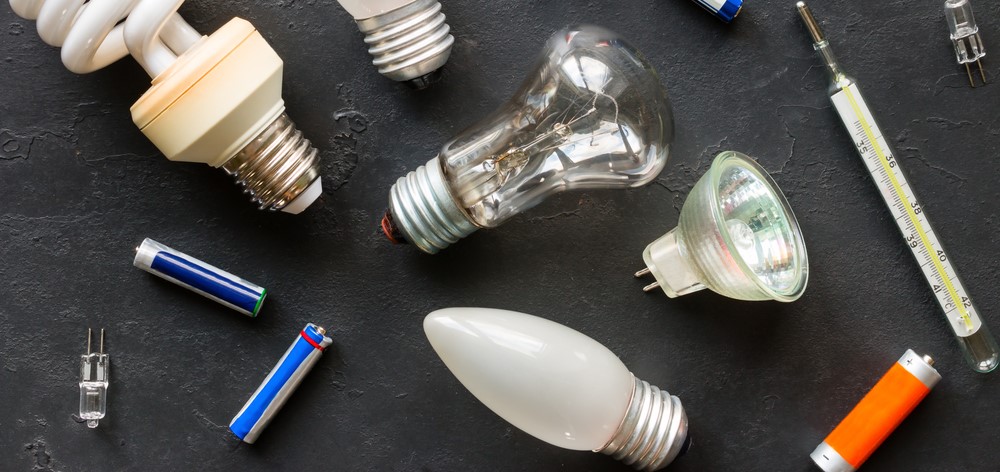Hazardous waste requires unique disposal protocols, much more so than the waste thrown out with your regular trash and recycling pickup.
Those protocols can be complicated, but fortunately, the Environmental Protection Agency (EPA) works alongside individuals and businesses to help protect people and the environment from mishandled hazardous waste.
What is Hazardous Waste?
So what exactly is hazardous waste? No, it’s not just green ooze that gives people, and sometimes turtles, superpowers: it’s something we deal with every day.
Think of materials like motor oil, large batteries, laptops, paint, cleaning chemicals, old TVs, fluorescent light bulbs, and cellphones. These products, and plenty more, become hazardous waste when it comes to disposal.
Broadly put, hazardous waste is any waste that will become dangerous to human or environmental health if not disposed of following the proper protocols. If something (under certain conditions) is ignitable, reactive, corrosive, toxic, or explosive, it’s probably hazardous waste.
How to Dispose of Hazardous Waste
For Households
Reducing the negative impact of hazardous waste is a cause everyone can support. While the scale of household hazardous waste is smaller than business waste, if we all make an effort to properly dispose of our dangerous trash, the impact will be felt for years to come.
The first step is understanding what can be put in the regular trash and what will need specific handling. Do your research and familiarize yourself with what your specific waste disposal service accepts. If you can put your waste in the trash normally, such as AA batteries or traditional light bulbs, put it in your trash can! If not, start researching where that waste can go.
Once you know what can’t go in your trash can, it’s time to find out where it can be sent. While your standard trash service might not accept it with their normal pickups, they might offer alternate services for certain types of hazardous waste. Reach out or go to their website to see what other residential disposal solutions they offer.
If you still have items that need to be disposed of, look for local specialized drop-off locations or mail-in services available for the specific hazardous waste. Most counties and local governments have designated facilities to dispose of hazardous waste. Some big box stores, such as Best Buy, will also accept hazardous waste like electronics for in-house recycling. Check with your local retail outlet to see if they accept specialty hazardous waste.
For Businesses
For legal and organizational purposes, the EPA and Resource Conservation and Recovery Act (RCRA) have developed specific regulatory definitions, processes, and classifications for hazardous waste. Business owners need to familiarize themselves with and practice all of these to protect themselves from legal ramifications.
Hazardous waste generators are responsible for the proper disposal of what they make. If a business creates hazardous waste as a byproduct of their production, they are tasked with the legal requirement of making sure it gets taken care of through the proper channels. This includes safe transportation from the production facility to where it ultimately ends up. This material is being shipped along the same roads as everyday citizens, so any mishandled waste can result in instant damage to your community.
The good news is that many hazardous waste materials can be recycled. Just like with any recycling, some hazardous waste can be broken down and reused, keeping the total amount of waste lower and limiting the overall consumption of our resources. This does come at the cost of additional work required to safely and effectively recycle the material. It will also create a risk of storage failures since it will be in circulation longer while being processed instead of immediately incinerated or otherwise disposed of. The EPA works to find a balance between conserving resources and protecting people and the environment through these recycling efforts.
How to Handle Hazardous Waste
Hazardous waste can carry different classifications, which designates how to dispose of that material. It’s important to take the time to fully understand what is classified as which, but using this flowchart from the EPA is a quick way to get a general feel for where your waste will land.
Once you have identified your hazardous waste, there are a few rules to be sure to aware of:
- Look for and follow any use and storage instructions commonly found on the products’ labels.
- Check labels for disposal directions and warnings to help reduce the risk of explosions, fires, leaks, dangerous chemical mixes, and harmful fumes.
- Keep hazardous waste in the original container since they are designed to contain the product without corrosion. Food containers and other uncertified receptacles run the risk of weakening and failing when moved.
- If you believe improperly stored waste may have damaged its container, do not handle yourself. Call your local hazardous materials official or the fire department, who have the proper tools and protection.
- Never mix hazardous waste products together or with other products. This includes consolidating leftover chemicals into fewer containers to save space. This can cause unexpected reactions that can be dangerous.
- Take care when handling and properly disposing of empty containers of hazardous waste as they can still contain dangerous residual chemicals.
Why it’s Important to Dispose of Hazardous Waste Properly
Hazardous waste earned its name. As volatile and dangerous trash, hazardous waste can pose a threat to everything and everyone around it. Sometimes it’s obvious how it’s dangerous—syringes, asbestos, medicines, toilet bowl cleaner, and gasoline for example—but often it is less obvious.
Improper disposal of hazardous waste can do a lot of harm. It can:
- Pollute the environment
- Physically hurt sanitation workers trying to do their job and not expecting dangerous items like needles
- Contaminate septic tanks and wastewater treatment through pouring dangerous chemicals down the drain or toilet
- Harm children or pets if left somewhere in reach at home
- Create long-term health issues for employees if not properly stored in workspaces
Both individuals and businesses need to be aware of hazardous waste, how to dispose of it, and why addressing that disposal pro-actively is necessary.




